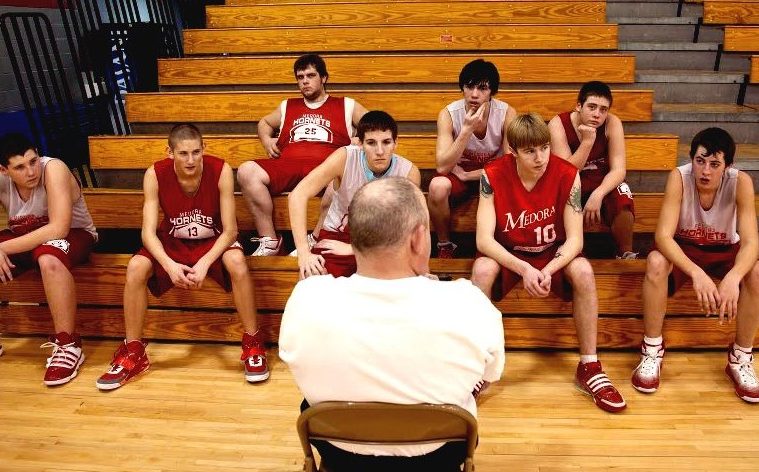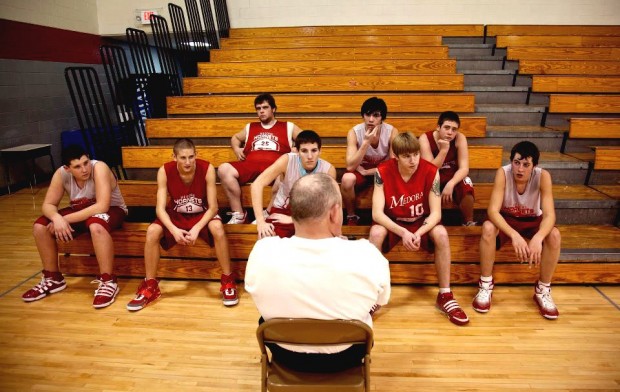
Medora follows a small Indiana town’s high school basketball team that is continually facing an uphill battle. Largely outpopulated by the conglomerated schools in the state, Medora has kept its small school and rarely finds success on the court. Directors Andrew Cohn and Davy Rothbart do more than just follow a small-town basketball team through their hardships. Within this documentary we see what it means to live in small-town America where the manufacturing jobs and all the money that went with it disappears.
There’s upward momentum but it’s not through sports — these kids have to use their brains and their willingness to learn to get out of their surroundings. At SXSW earlier this month I had a chance to sit down with Cohn and Rothbart. Together we talked about the stacked deck against the kids, what went through their head when they filmed underage drinking, the lack of fights, the lasting effects, and much more.
The Film Stage: I come from a small private school in Dallas and they had a very rough time with their girls’ basketball team where they were thinking of just scrapping it. But our teams were private schools, so we played other small private schools and we had divisions so when we played another team we weren’t at a huge disadvantage in student population to this amount. So it’s incredible to see that and realize, “Wait, [Medora has] 72 some-odd students versus 500 students, 600 students.” It’s David versus Goliath in a practical sense and Goliath usually would win. How aware are they of that fact? That they’re kind of in a very unique situation where most schools like that would play other small schools?
Davy Rothbart: Yeah exactly. I think they realize that and the decks are stacked against them, in basketball and life, really.
Andrew Cohn: I would say to me, when I think of a school of like four or five hundred, that’s a small school. For a public school, that’s pretty small. But Medora’s beyond small. They had 13 kids in their graduating class; that was a big graduating class for them.
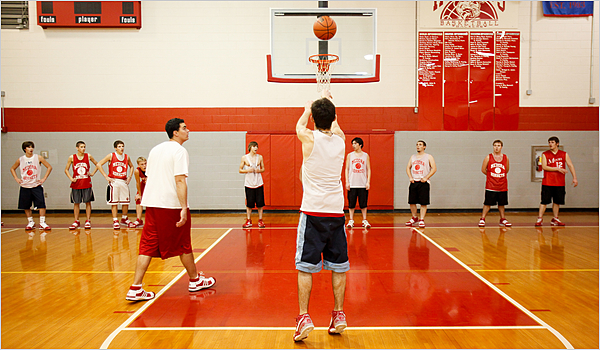 I had 23 in mine. It’s crazy.
I had 23 in mine. It’s crazy.
Cohn: And also, the other thing is, these schools in Indiana, like the other high schools, their basketball teams are like machines. When I saw Medora the first time—and I played basketball—and when I was at Medora I was like “these guys aren’t that bad, how did they not win a single game?” And then they’d go play these other teams and they’re just like these All-American bred basketball robots. And then you look over at Medora and it’s kind of like all shapes and sizes and tattoos and just kind of this motley crew. A few times I was there before the game they’d be like, “don’t be intimidated by the size of the school, don’t worry about how many people are in the stands.”
Rothbart: And one crazy thing is just how huge basketball is in Indiana. You really got a sense of it because these schools, even the big ones, are generally not huge schools but their gyms… We went to Andrew’s High School in Annarbor, Michigan and this high school had like 2,500 kids, Medora, with 72 students, had the same size gym. So that’s Medora. Some of these schools, like Orleans, had five, seven hundred students; their gyms were like college arenas.
Cohn: And then the size of the town is like…that’s one thing I’m not sure is communicated in the film, it’s less than 500 people living in the entire town. You could fit the entire town in the Vimeo Theatre. That was what was weird to me. My mom is from a small town in Indiana so I’m used to it. It’s actually smaller than Medora but I hadn’t been there in a long time and going to Medora was like…and it’s not spread out either. It’s concentrated. There’s a little downtown, basically one stoplight, a bank, a liquor store, a bar.
Rothbart: Is there a stoplight even?
Cohn: No, there’s no lights. There’s a couple of stop signs. There’s a mill. There’s a couple trailer parks and a few houses and that’s it. And you could walk all the way across it. It’s not like sprawling. And then it’s just surrounded by fields. It’s so isolated too.
Rothbart: It is funny because certain parts of it were like, if you’re just walking down the street it seems like you’re in some town somewhere. It’s all close together for like four blocks by four blocks and then it’s field. But one of the interesting things is, the kids, I don’t think they even realize how hard they have it. They’re not self-pitying, they don’t go “oh things suck for us” because that’s everybody they know, living the same life basically. So there’s a little perspective for how serious the hardships are that they’re facing. But they’re upbeat, they’re fun kids, they like running around playing basketball, bowling. It’s interesting.
Cohn: Yeah I was gonna say it’s a lot of the same factors that’s going on in the inner city; little opportunity, poverty, a lot of drug deals but you don’t usually see that face on those type of issues. That’s what’s interesting about the film, you get a sense of [the fact that] these issues aren’t just affecting one type of [sector]. It’s not just in the inner city, people who have less opportunities and things like that. These kids have never been to Wilmington, which is forty-five minutes away. Most of them have been to Minneapolis, which is an hour and a half away. For them going to Brownstone, the next town over has like 10,000 [people], that’s like going to the big city.
Obviously your time is limited when you go down there, you probably go down with a certain amount of budget or time limit and things like that so you gotta come back and do a story, right? So, did you interview every single player from the basketball team and, if you didn’t, did you have these kinds of conversations with the players where “no, we’re gonna focus on this guy.” Almost like firing them in a way.
Rothbart: We spent time with every player. The good thing was that we were not very limited in terms of our time. We were still filming constantly and running around and trying to get it the way we wanted to. We were there for like seven months. We moved to the town. So it wasn’t where you go in for two weeks and you gotta find a story fast. We sat down with all the players, we interviewed their parents, we interviewed 600 townspeople. We had 600 hours of total footage.
Cohn: Actually, most of the kids we interviewed…
Rothbart: Yeah we really could make ten films just with the footage we shot without repeating a single frame. Because there’s kids that we spent a lot of time with that are not in the film and yet they have their own compelling stories. We got really close with a lot of the kids. One way we divided it was Andrew and I and a couple of other friends that were there shooting with us, we each tried to pick two to three players that we would really focus on. So I focused on Dylan and Rusty and he focused on Robby and Chaz and Logan Farmer.
Cohn: Like Logan Farmer, we always knew we had this great scene of him with the army recruiter and we had the great scene of his family watching the Obama speech and we wanted to figure out how we could make him one of these secondary characters. Until the free-throw. That was a way for us to just, and Devon, the cheerleading coach, to give people sort of a panoramic view of the town. Not just following two or three kids. You really get a sense of more characters.
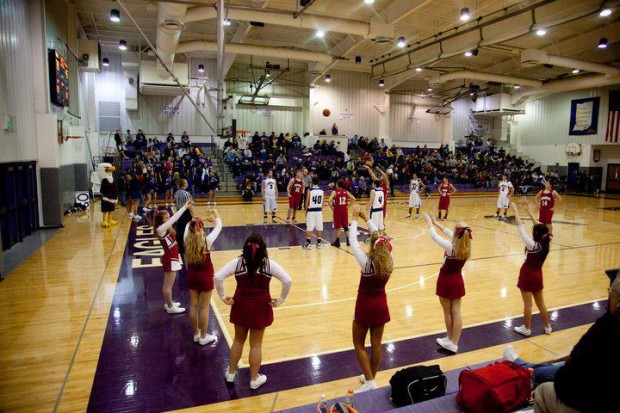
They’re constantly either on the road or being visited by other schools. It’s basketball season, that’s what happens. But you don’t interview any of the other coaches or any of the other players. Were you hesitant to do it? Did you do it and just edit it out?
Rothbart: It was more a matter, I think, of wanting to just stay in the world of Medora. Andrew did a great interview with a professor at Indiana University. It’s only forty-five minutes away and he’s really breaking down some of the… he’s talking about school consolidation and the plight of these kids and how little opportunity there is for them. And even though he was a great voice and he said some really important things we just felt like, “you know, let’s just stick to these kids and their families and these coaches. Let’s stay in the town of Medora.” And so even to go to Bloomington it felt like you’re pulled out of the town you’re pulled out of the story. So yeah, some of the other coaches, we talked to a lot of people from surrounding communities but ultimately we didn’t include those.
One of the more interesting parts of the film for me is, we know as an audience member that these are high schoolers and yet there are scenes where you filmed them drinking. And I’m curious to get your reaction on how you went about that, what was your mentality going in to just document this. Did you feel compelled to maybe step in and say “hey guys, we shouldn’t be here” or…
Cohn: They would have been drinking without us. I mean, for people to pretend like kids don’t drink in high school, that’s just not gonna happen. So I mean, at some point we did feel a little responsible like, “What if something happens and we’re here filming?” So there was a line somewhere, we weren’t gonna let anything bad happen. But at the same time, we’re not their parents. They would have been doing the same thing if we weren’t there with cameras but I mean, that was my take on it.
Rothbart: I just felt like, exactly what you said and, we got to know these kids so well that they forgot we had cameras sometimes. And not just in these party scenes but just in general, they just felt comfortable hanging out with us and so when they were sharing very personal stories from their lives they knew that it was being filmed and one day it would be shared and they were OK with that. I got so close to Dylan and the rest of the team. They were generous and they were very open. They were willing to be open and honest with us about what they were going through in their lives. So, in their mind we were just hanging out at the party with them and we’re there filming, we’re there shooting stuff but literally the cameras had become invisible to them by the time we’d been there a couple months.
Cohn: But there were a few times where they’d call us and early on we didn’t feel comfortable. I remember New Year’s Eve and they were all like “yeah come party, come film us” and that was kind of early and we were just kind of like “this doesn’t feel right” but then as it went on, it was actually kind of like an organic thing we just happened to go with them and they happened- it wasn’t like we planned it or anything. We happened to be there. And then there’s that great scene with Rusty, which I love where you see him not drinking. We didn’t wanna put that stuff in there just to put it in there. That scene’s in there for a reason. Because you see this kid Zach, and Zach is having this very high school moment where he’s hammered and kind of saying some stuff he probably doesn’t mean and they’re friends and he probably didn’t even remember it in the morning but you really get to see Rusty change so we didn’t put the stuff in just for shock value we put it in because it was an important scene. And if that wouldn’t of happened in that scene it wouldn’t of been in there. It’s the same thing with Rusty when he gets caught drinking the first time you see them drinking…
Rothbart: This is something his family’s obviously dealt with for generations.
Cohn: It’s part of his story, it’s not just…
Rothbart: And at the end of the day I gotta say with all the things that happened, with all the things they could be getting into, drinking felt, to me, pretty innocent. Obviously it can lead to worse things and Rusty’s seen his mom go through that but I felt in comparison to other temptations that were probably out there…
It’s striking to see these kids because even though they’re down and out and even though they’re high schoolers and yes, they’re going to a small high school. But in high school fights break out and things like that happen and it seems like a lot of these sports documentaries following high schools showcase that these kids butt heads and have a rough time a bit. But not here. Were these kids just that mellow?
Rothbart: Here’s the thing about this town. It’s so small. There’s no cliques on the team, there’s no popular kids.
Cohn: There’s only seven boys in each class. There’s literally not even enough students to have different sections and cliques.
Rothbart: Yeah they just all hang out with each other in different permutations and they’ve all grown up together within an area not much bigger than…
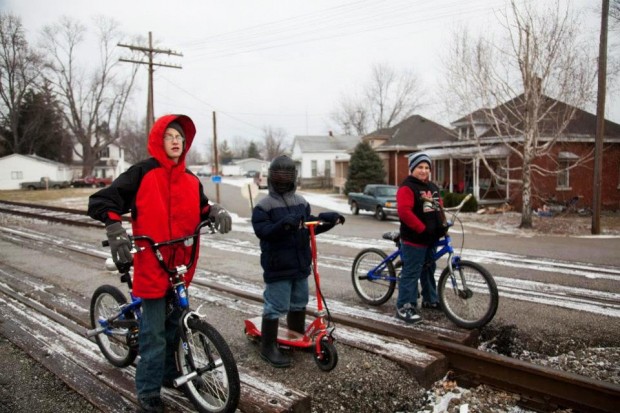
Nobody’s moving into Medora.
Rothbart: Yeah. They’ve known each other’s families, they know each other, they just really support each other and try to uplift each other and they’re all friends.
Cohn: It’s one group of friends basically.
Rothbart: Yeah it’s weird.
Cohn: Remember when we were at Taco Bell after that game and you were like “that’s weird, Robby’s hanging out with Chaz.”
Rothbart: We were watching some footage.
Cohn: And Robby and Chaz, you look at them in the movie and they’re so different. One’s a freshman and one’s a senior. They’re just very different people but they hang out. Like they’re at Taco Bell just talking and eating together and that’s when it hit us; there’s not cliques on this team. Everyone just kind of hangs out.
Rothbart: It really is like a family because these people have all known each other since they were little kids.
I’m curious about the main coach of the team because it seemed like he had a lot of assistant coaches and things like that. He holds a very unique position in this town because of being the coach of the high school basketball team and also being a police officer. So he can kind of understand, who are the trouble makers, which kids are maybe falling off the tracks and the scene where he has to let Chaz go from the team, it seems like he kind of understands the fact that, “when I do let Chaz go, he’s probably not going to go in a good direction here.” Did you have some conversations with him about that kind of decision?
Rothbart: Yeah he was here this week in Austin, Coach Gilbert, with two of the players, Dylan and Robby, and he told me, one night we were just talking and he said he really likes the film and he was able to laugh at himself in a way he gets crazy during games and stuff. But he says his biggest regret from the season was that Chaz wasn’t able to finish the year. It’s one of those things where a lot of educators go through this. He desperately wanted to help Chaz, but is it to the detriment of the other players on the team? Is he messing things up and dissolving the community?
Cohn: He draws a line in the sand and he continues to cross it. How does he have any authority for the rest of the team? That was his take on it. But he had given him a lot of opportunity. It wasn’t like his first time being in trouble.
Rothbart: But he did say that felt Chaz was probably the one that needed it the most and the fact that he couldn’t make it work was something that still plays on his mind a little bit.
Medora screened at SXSW 2013 and will continue a festival run throughout the year.

